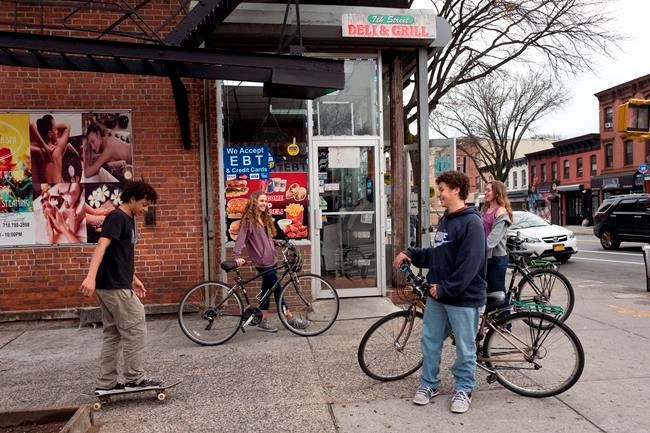ALBANY, N.Y. — New York Gov. Andrew Cuomo announced sweeping orders Friday that will severely restrict gatherings of any size for the state's more than 19 million residents and will require workers in nonessential businesses to stay home.
No more play dates. No more pickup basketball. No more subway rides except if absolutely necessary.
The Democratic governor said the “drastic action” was needed to check the rapid spread of the coronavirus virus in a state with more than 8,000 confirmed cases, the most in the nation. New York’s restrictions, effective 8 p.m. Sunday, come a day after California decided to all but confine its population in the biggest lockdown in the U.S.
"No, this is not life as usual,” Cuomo said at a news conference. “Accept it, and realize it, and deal with it."
New York officials said more than 1,200 people have already been hospitalized since the outbreak, and new restrictions are needed to keep the health care system from being overwhelmed.
Johns Hopkins University put the state's fatality count at 46, though that was likely an undercount. New York City officials said that as of 6 p.m., there were 43 deaths in the city alone.
The restrictions were applauded by public health officials.
“It is incumbent on all of us, young and old, and especially the young, who might think they are invincible, to stay the heck indoors," said New York City Health Commissioner Dr. Oxiris Barbot.
Under the rules, nonessential gatherings of people of any size or for any reason are
Workers seen as essential to keeping society functioning were exempt. The category was somewhat expansive, including delivery workers and convenience and liquor store clerks, along with many others including teachers, cops and health care workers.
People will be able to walk outside or take part in non-contact activities, but should not be “playing basketball with five other people,” Cuomo said.
The restrictions will ban parents from bringing kids to play dates at friends’ houses or to playgrounds, if they can't guarantee ample space with other people.
Public transit will keep running, but people besides essential workers should only use it when absolutely necessary.
People will need to stay at least 6 feet (1.8
The new restrictions were met with resignation by people across the state, where museums, clubs and many restaurants are already shuttered and big gatherings were already prohibited.
“There's a season for everything. And right now, the season is to just lay low, stop spreading this viral thing around," said Eddy Dobosiewicz, of Buffalo, who just got a haircut before barbers close this weekend. "And then once that's under control, I promise all we're going to have a party.”
Edjo Wheeler, 49, who runs an art
“That makes me walk around with my hands in my pocket to make sure I'm not touching things. I might have it, and I might be able to pass it on to somebody else," Wheeler said. "It's not about me getting it. I'm not really the in-danger population, but we all have to
For most people, the coronavirus causes only mild or moderate symptoms, such as fever and cough. The vast majority of people recover.
But for some it can cause more severe illness, including pneumonia, or death and stricter rules were put in place for people over 70, people with compromised immune systems and those with underlying illness. They should prescreen all visitors and aides by taking temperatures and avoid visiting houses with multiple people. All vulnerable people should wear a mask when around others, and everyone in their presence should wear a mask.
Additionally, only essential businesses can have workers commuting to their jobs or in their offices, Cuomo said. The order tightens previous work-from-home restrictions and exempts a long list of businesses as essential, including health facilities, utilities, airports, food makers, grocery stores, farms, convenience stores, laundromats, funeral homes and banks.
Cuomo said there will be fines and mandatory closure for any business not in compliance.
"These provisions will be enforced” he said. “These are not helpful hints.”
New York City Mayor Bill de Blasio said police officers would be out "reminding people, educating people, warning people” about the rules and would be empowered to break up large groups.
Cuomo’s decision won strong backing from Dr. Anthony Fauci, the nation’s infectious disease chief and member of the White House coronavirus task force. Fauci also issued a direct appeal to his fellow New Yorkers to obey Cuomo’s orders.
“We’re tough. I was in New York City on Sept. 11, 2001, and I know what the New Yorkers can do,” said Fauci. “So please,
___
Associated Press writers Karen Matthews and AP photographer John Minchillo contributed from New York. AP writer Carolyn Thompson contributed from Buffalo, New York, and AP writer Darlene Superville contributed from Washington.
___
The Associated Press receives support for health and science coverage from the Howard Hughes Medical Institute’s Department of Science Education. The AP is solely responsible for all content.
___
Follow AP coverage of the virus outbreak at https://apnews.com/VirusOutbreak and https://apnews.com/UnderstandingtheOutbreak.
Marina Villeneuve And Michael Hill, The Associated Press


